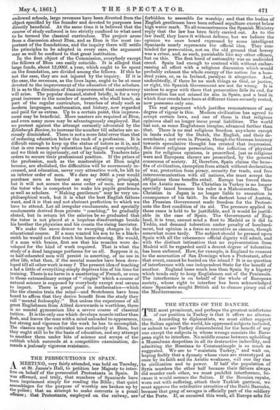THE PERSECUTIONS IN SPAIN. A MEETING, very fairly attended, was
held on Tuesday, -El_ at St. James's Hall, to petition her Majesty to inter- fere on behalf of the persecuted Protestants in Spain. It was affirmed, and truly, that numbers of Spaniards have been imprisoned simply for reading the Bible ; that quiet assemblages for the purpose of worship are broken up by the police; that an attempt to make converts is a penal offence ; that Protestants, employed on the railway, are forbidden to assemble for worship ; and that the bodies of English gentlemen have been refused sepulture except below high water mark. To all remonstrances the Spanish Ministry reply that the law has been fairly carried out. As to the law itself, they leave it without defence, but we believe the opinion we once heard expressed by some intelligent Spaniards nearly represents the official idea. They con- tended- for persecution, not on the old ground that heresy was a crime, and, as such, punishable like any other offence, but on this. The first bond of nationality was an undivided creed. Spain had enough to contend with without embar- rassing all effort with a religious discussion which would probably exhaust the whole energy of the nation for a hun- dred years, or, as in Ireland, paralyze it altogether. And, undoubtedly, if there be no such things as God, or justice, or right, the Spanish Government are not far wrong. It is useless to argue with them that persecution fails its end, for persecution has not missed its aim in Spain, and a land in which four creeds have been at different times securely rooted,, now possesses only one. The real argument which justifies remonstrance of any' degree of vigour is this. Modern civilization has agreed to accept certain laws, and one of them is that religious opinions shall no longer incur penal liabilities. The world has not, as some Englishmen imagine, advanced farther than that. There is no real religious freedom anywhere except in lands ruled by the Dutch, the English, and their de- scendants; not even in Prussia, though the German leniency towards speculative thought has created that impression. But direct religious persecution, the infliction of physical pain for religious opinions, is proscribed, just as religious wars and European slavery are proscribed, by the general consensus of society. If, therefore, Spain claims the bene- fits of civilization, exemption from attack without declaration of war, protection from piracy, security for trade, and free intercommunication with all nations, she must accept the obligations those benefits entail. Europe has forced them on the Asiatic races. The Christian in Turkey is no longer specially taxed because his ruler is a Mahommedan. The Christian in Japan is no longer liable to execution in consequence of his faith. In the darkest hour of Austria, the Prussian Government made freedom for the Protest- ants the first condition of its aid. The pressure applied in these cases is held to be justifiable, and it would be justifi- able in the case of Spain. The Government of Eng- land, it is true, cannot send a fleet to Madrid as it did to Yeddo, and demand toleration under penalty of bombard- ment, but opinion is a force as executive as cannon, though somewhat more tardy. The subject should be pressed upon Spain with all the vehemence official dignity will admit, and with the distinct intimation that no representation from Madrid will be regarded until a decent degree of toleration has been enforced. How, for example, is England to consent to the annexation of San Domingo when a Protestant, after that event, cannot be buried on the island ? It is no question of interference with one independent State for the benefit of another. England loses much less than Spain by a bigotry which tends only to keep Englishmen out of the Peninsula. The interference is on behalf of the whole of European society, whose right to interfere has been acknowledged since Spaniards sought British aid to cleanse piracy out of the Mediterranean.






























 Previous page
Previous page